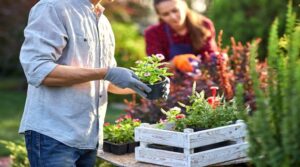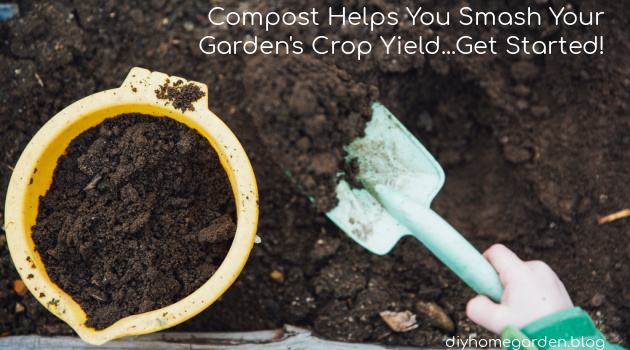Gardening doesn’t mean just growing plants, but also growing life. Garden plants add beauty to your garden by providing a breath of fresh air. However, most people think that gardening is just for the rich. It’s actually more affordable than that. If you want to grow beautiful flowers, vegetables, or fruits, you don’t have to spend a lot of money. You just need to know about the different things required to grow a healthy and thriving garden.
6 Tips on Growing Healthy Garden Plants
But before you hurry to buy soil, tools, and seeds, here are the things you should know about before you can start gardening:
-
Choose The Right Type of Soil
Soil is one of the top essentials for growing plants. You can plant on the ground or you can choose to plant on a pot. Just make sure that you’re leaving enough space to ensure the healthy growth of their root system. For example, don’t place a plant in a pot if you’re expecting it to grow like a shrub.
The right type of soil helps nurture the plant to grow healthy and strong. Some of the available kinds of soil are clay, sand, silt, peat, chalk, and loam. Generally, loam is known as the best soil for plants. It’s a combination of sand, clay, and silt. It’s also often referred to as topsoil or black dirt.
-
Plants Need Enough Light
Just like people, plants need their daily dose of sunlight as well. Your garden plants need enough light so they can grow healthy and vibrant. Most of the time, the amount of light they receive depends on how lively their colors are like the Croton Petra. This plant shows its full color when it gets enough sunlight.
Place your plants where they can receive the most amount of light during the day. Most plants require 6 to 8 hours of light daily to grow well. However, if the location only gets a few hours of bright light, choose a plant that doesn’t require heavy lighting.
-
Determine Irrigation
Unless you’re planning to grow a cactus, you’re going to need to water your plants. Make sure that they get their recommended amount of water to help them grow healthier and faster.
An irrigation system is one of the most important factors in gardening. It’s also the most difficult. Plants need a lot of water to stay alive and grow well, especially in areas where temperatures are extremely warm. If the soil is too dry, the roots will freeze and die. In addition, excessive watering can actually harm plants by drying out the root system and robbing them of the nutrients they need to grow. A balanced watering schedule is the best way to ensure that your plants get all the nutrients they need to grow healthy.
-
Avoid Crowding
Of course, you’ll be needing plants for your garden! Make sure that you’re raising plants that can handle the temperature that you’re in. Don’t opt for plants that require hot temperatures, especially if it’s always gloomy and cold in your location.
If you’re unsure which plant works best, you may check the USDA Plant Hardiness Zone Map to see which plant is the best for your location. This will allow you to grow healthy plants. If you want to plant something edible, consider planting vegetables so that you can harvest them after.
If you’re planning to grow different kinds of plants, take note of their distance and don’t place them too close to each other, especially if you’re planting them to the ground. Don’t let them be too crowded. It’s recommended that you only plant one kind for every row of soil rather than combining them with others.
-
Use Fertilizer
If you want your plants to grow extra healthy and strong, add fertilizers at least once a month. Fertilizers add nutrients to your plants such as nitrogen which is responsible for the promotion of leaf growth, and phosphorus which helps with keeping your roots healthy. After all, the most important part of your plant is their root as this is their heart that gathers nutrients from soil and water.
There are two kinds of fertilizers: chemical and organic fertilizers. Chemical fertilizers are more concentrated and powerful for plant growth. Organic fertilizer, on the other hand, also works well and is preferred by those who want more natural options. It really depends on your own preference.
If you’re deciding to add fertilizer to your plant, you can simply sprinkle them over the soil and spread with a rake or fork so that they can be combine with the soil and distribute the nutrients they contain.
-
Use Mulch
Mulch helps reduce the amount of water that evaporates from the soil so the roots can fully absorb the water without it drying out immediately because of the heat of the sun. Rocks work as well but mulch provides additional nutrients to the soil and helps sandy soil absorb more water and improve its water retention capacity.
If you’re wondering how to apply mulch, it’s actually quite easy. Spreading mulch for about an inch or two depending on the temperature. Take care not to cover the whole plant entirely and allow room for air and plant growth. This will also help prevent rot.
 The Bottom Line on Successfully Growing Your Favorite Garden Plants
The Bottom Line on Successfully Growing Your Favorite Garden Plants
Gardening is not a hard task. It’s something that anyone can do if they put their mind to it and put in the necessary work and effort. Gardening is not just about having beautiful yard to look at. You can grow your own varieties of fruits and vegetables in your garden, and save some money on your groceries. Gardening plants also improve the air quality of your environment, which is truly helpful especially if you live in the city.
Before you get started, it’s important that you check the environment and location that you’ll be planting them so that they could have the nutrients that they need. It’s also said that talking to plants helps make them grow healthier. There’s not enough science to prove this, but trying it won’t hurt.



